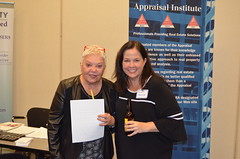Category Archives: The Value of a Good Appraiser
Meet Your 2014 Board of Directors
Meet Your 2014 Board of Directors
1st Row (Officers)- Left to Right: Peter Poulos, MAI (Past President), Rick Hiton, IFAS (Vice President), Richard deVerdier, MAI, SRA, AI-GRS (President), Mike Morris, ARA, MAI (Treasurer) Barton DeLacy, MAI, CRE, FRICS (Secretary)
2nd Row (Directors) – Left to Right: David L. DuBois, MAI, Ken Mrozek, MAI, SRA, Lisa Musial, IFAS, Warren Grover, SRA, Herbert Meyer, ARA, Brian Masterson, Karen Emerle, SRA, LA Anderson (Executive Director)
3rd Row (Directors) – left to right: James R Blaydes, SRA (Legislative Chairman), TJ McCarthy, SRA, IFA (Webmaster), Mark Munizzo, IFAS, Michael A. Wolin, MAI, SRA, Tom Rodgers, MAI, SRA, John Van Santen, MAI
Absent: Joe Calvanico , MAI, Ted Neff , SRA
The 18 members of ICAP’s Board of Directors are appointed to promote the appraisal profession and its image to the general public and to the users of appraisal services. Together, with input from its sponsors and members ICAP monitors, informs and influences legislative issues that impact our profession.
About ICAP Seminars
ICAP’S annual seminars are industry recognized educational events dedicated to inform and positively impact the appraisal profession. Learn the latest information about the future of the appraisal industry and network with regulators and other valuation professionals. ICAP’S annual seminars qualifies any Illinois licensed or certified attendee seven hours of continuing education.
Apppraisers find value in ICAP’s 2nd Annual Golfrey Seminar
On August 2, 2012, ICAP presented Program 2 of their 2012 Illinois Appraisers Update Seminars. This year, approximately 50 attendees participated in the second annual seminar held at Lewis & ClarkCommunity College in Godfrey, Illinois. ICAP President, Tamara (“Tami”) Bellisario, opened the seminar with a brief description of the coalition. The Illinois Coalition of Appraisal Professionals (ICAP) was formed in 1994 between five appraisal organizations for the purpose of being a conduit between appraisers and the State. It was the first appraiser coalition in the United States. In part to ICAP’s work, currently 20 states have formed their own coalitions to work with their state legislatures. ICAP has earned a position of recognition, and today, ICAP opinions have weight and influence when new legislation is being considered. The ICAP Board of Directors includes 17 volunteer members, working on several different committees. Currently, ICAP membership is approximately 1800, or a little less than half of all IllinoisState appraisers. In 2012, a new ICAP website debute providing access to a variety of links pertinent to the appraisal profession.
The topic, Guidelines and Requirements, presented by Lee Lansford, IFA, ASA, of Lansford & Associates covered current and recurring issues affecting Illinois appraisers. The purpose of Lee’s interactive presentation was to stimulate thought, and where appropriate to affect appraiser behavior in order to attain a professionalism based on a “best practices” principle. Lee reminded us that we get paid to communicate.
We are professionals responsible for communicating a credible report. He asked us to consider if our communication (via the form report) supports our opinion? If not, how can we better communicate with our client? Lee covered hot topics of common errors and deficiencies seen in appraisal reports: Effective age versus actual age, use of FNMA forms for private appraisals, neighborhood descriptive comments, “best comps” available scenarios, zoning, data consistency issues between URAR and 1004MC forms, use of MLS photo images, importance of property inspection by signatory appraiser, GLA of subject property, cost approach applicability, work files, 2-4 flat market rent issues, BPOs, Scope of Work, and the differences between “guidelines” and “requirements.” Lee’s thoughtful and informative presentation also provided the attendees with insight in how to correct common errors and deficiencies. By applying a “best practices” principle to our work product, appraisers can re-establish with our clients the value of our professional appraisal services.
Elizabeth Kern, IFAS of Frank L. McAtee & Associates discussed “Resources, Gathering and Presenting Local Economic Data for your Appraisal.” Elizabeth emphasized the importance of researching everything an appraiser should be considering in order to provide the client with the best appraisal possible. Asking us to ponder the questions, “Am I communicating in my appraisal report why I arrived at the opinion I did? Is my opinion supportable and credible?
Elizabeth reminded us that as appraisers we should not just use MLS data, how demographic data will help our analysis, and provided specific resources that are available for free. Give-away’s highlighted the morning breaks when numerous attendees received coupons to local eateries. Lunch was at large with many partaking of the college cafeteria’s diverse menu and out door veranda dining. A sunny and beautiful day the veranda overlooks the campus grounds and architecturally attractive buildings. The Godfrey campus is located on the 215-acre ground of the former MonticelloCollege, a small, private liberal arts college for women founded in 1838. The campus features sculptures and fountains, and includes a garden site of the Missouri Botanical Gardens.
Deb Higgins, Senior Loan Officer, at Pulaski Bank started off the afternoon session. She addressed underwriting as it pertains to appraisal. Deb mentioned that the appraisal is reviewed two or three times before the underwriter ever sees the report. She reminded the attendees of the importance of consistency in their reports, the new FNMA UAD condition requirement, the importance of finding out up front what the concessions are, if any, concessions given after inspection, and cash back at closings. The Q & A portion of the presentation turned in to a rather lively debate.
James Blaydes, SRA, and Tim (TJ) McCarthy, SRA, IFA brought attendees the latest information on Illinois Legislative Updates and AMC’s. Jim reminded us when we sign an appraisal report, one is then held responsible for what information is in that report. He reminded the ICAP appraiser members of their importance to the legislative process. He expressed thanks to the members for their supportive phone calls and e-mails to their respective legislatures as the various proposed bills worked their way through the legislative process. Jim recapped the process of enacting legislation, the bills passed, pending, on hold and defeated. AMC regulations have now been enacted in 33 states
TJ covered the AMC Registration Act, the definition of an AMC and those considered exempt. He highlighted what constitutes a “bad” AMC, those interested in maximizing productivity rather than in the quality of work. Typically, they require quick turn times and low fees. TJ mentioned the AMC Act will require the AMCs to be licensed and help to provide consumer protection, develop industry standards, provide customary and reasonable fees for appraisers, help to eliminate scope creep and that competent appraisers are hired to complete appraisal assignments. Commencing on 1-1-2012, it is now waiting for the rules to be done and approved. The rules will provide Standards of Practice for the AMC, spelling out what they can and cannot do. Once approved, AMCs must register within Illinois. We are approximately eight to nine months away from the rules being completed.
Brian Weaver, Illinois Appraisal Coordinator, closed the afternoon session. His “State of the State” covered a range of topics. The “3 appraisers, 3 trainees” language was just repealed, and they are working for approval. Currently the number of appraisers in Illinois is 4,435 with an average age of 58 years. There is a 75-80% retention of Certified Residential Appraisers. Every two years, the state loses 40-45% of the trainees. Appraisers who do not live in the state total 500. Brain reminded everyone that Illinois “reciprocity” with any jurisdiction ended in 2009. Illinois now has “endorsement.”
The Appraisal Board has a new chair, James Blaydes, for the fiscal year end 2013, and a new board member, Tony Uzemack, MAI. Jim is from the Peru area, and Tony from the Park Ridge area. Brian reminded us that appraisers in Illinois are now required to take USPAP within six months of any new USPAP release. Those who have not taken the update class, should do so ASAP. The Board will be disciplining those who have not complied when the CE audit is conducted at the next license renewal in 2013. Brian also reminded those with multiple state licenses to keep track of their CE hour requirements by state license. This is to insure compliance as each state has different criteria and renewal dates.
Complaints: Brian spoke about the lenders who lodge the most complaints and those who Brian never hears from. The percentage of Illinois appraisers who have complaints filed against them is the same percentage as seen across the country. The good news: 94% of Illinois appraisers are complaint free! Brain spoke of upcoming items: A new supervisor/trainee course by 2015, attempting to reduce the course provider fees from $1,050 to $200 with more Board control over content, Appraisal Port safe uploading issues, signature removal issues, JCAR two 45-day comment periods, Appraiser Rules, UAD, BPO problems, a state survey for C & R fees, and the continuing progress in updating the website at www.idfpr.com/dpr/re/appraisal.asp. Brian reminded us of the requirement to report timing on all market value assignments. He reviewed the fair housing and privacy laws regarding interior photos, religious decorations or personal artifacts as it applies to appraiser photos of the subject. He also issued a reminder that a certified residential appraiser cannot do an appraisal of a working farm. A certified residential appraiser can do “1-4 family with no regard to transaction value.” And always informative, Brian entertained us with his road trips and explained the definition of a “nooner” soil.
Just down the road, (about a 10 minute drive in rush hour) on Homer M Adams Parkway, out of town attendees had accommodations at the Lewis and Clark Holiday Inn in Alton, IL. The facilities include an indoor pool, whirlpool, exercise facility, business center, restaurant, bar, and atrium. A buffet breakfast is included with each morning of your stay.
Many thanks go to Lee, Elizabeth, Deb, TJ, Jim and Brian for providing us with their expertise and a great educational experience. Many thanks go to ICAP President, Tami Bellisario, who traveled from LakeCounty in Northern Illinois to be on hand to meet and welcome all attendees. And last, but not least, many special thanks to Elizabeth Kern for arranging the details of ICAP’s downstate seminar, the venue, the speaker line-up, hotel accommodations, and hosting the seminar.
-Karen Emerle, SRA
ICAP’s President is Featured In the Daily Herald
In a July 11, 2012 Daily Herald article titled “Mortgage rates at historic lows, but it’s harder to refinance” Anna Marie Kukec writes that despite the fact that mortgage rates have dropped to historic lows, there are some homeowners who can’t take advantage of the low rates.
The article states that a job loss, a poor credit score or a reduced home value in a tough real estate market littered with foreclosures is making it difficult or impossible to qualify for a new home loan.
Tamara J. Bellisario, president of the Illinois Coalition of Appraisal Professionals (ICAP) and president/owner of Bellisario Property Consultants in Gurnee contributes to the article by stating that, “seeing concrete evidence of what their home is worth can be a shock, even for those who aren’t trying to sell, this has been very difficult for homeowners because their values aren’t where they need to be, and that when homeowners see the loss of value, it can be emotionally difficult.”
Ms. Bellisario goes on to say that “We (appraisers) have more government restrictions on us now than ever before; a 12-page report has now become a 40-page report.”
To read the full article click: http://www.dailyherald.com/article/20120711/news/707119943/
ICAP Member Featured In the Chicago Tribune
In a June 01, 2012 Chicago Tribune Article titled “Understanding the Square Footage of Your New Home” Erik J. Martin writes that all square footage is not created equal, and that many shoppers blindly trust that the size of a new home featured in an ad or brochure is accurate.
The article states that real estate appraisers calculate the Gross Living Area (GLA) as the total finished, walkable and heated area above grade, as measured along the building’s exterior; the article goes on to say that completed areas below grade, such as finished basements, are not included in the GLA.
Bruce Wittman, SRA, ICAP member and partner with Papineau Wittman Group in Joliet contributes to the article by stating that “In my market area, builders are pretty accurate in the square footage they provide, and that builders will sometimes include finished areas below grade in split-level or bilevel houses, whereas an appraiser can only include those areas above grade in the Gross Living Area. In this case, the finished area below grade would be given value in a different part of the appraisal report.”
To read the full article click: http://articles.chicagotribune.com/2012-06-01/classified/ct-home-0601-square-footage-20120531_1_square-footage-dick-greenwood-home-appraisers
ICAP’s Immediate Past President is featured in the Chicago Tribune
In a March 16, 2012 Chicago Tribune Article titled “When good deals go bad, tips to keep your real estate transaction on track” Kari Richardson gives a few appraisal strategies to help keep a deals on track.
The following is an excerpt from that article:
After languishing on the market for months, a buyer has finally signed a contract to purchase your home. Think congratulations and Champagne are in order?
Or try this scenario: After months of open house appearances and weekend dates with your Realtor, you’ve finally found a place you’d be proud to call home and signed a contract to buy. Think you’ve arrived at the finish line? Maybe, maybe not. Survey data from the National Association of Realtors found that 33 percent of its member agents reported a contract failure in December, up from 9 percent in December 2010.
The statistic highlights a new truth of a topsy-turvy housing market: It ain’t over till it’s over. Jittery buyers, a glut of short sales, financing hurdles and an imbalance of power between buyers and sellers mean the difficulties of selling a home extend well beyond the time a contract is signed. It used to be unusual for real estate contracts to fall through, said Naperville real estate attorney Dan Collander, who’s been practicing since 1979. Although he doesn’t keep a formal tally, he estimates that 5 to 10 percent of his deals now fail to close for one reason or another. The buying or selling finish line isn’t a signed contract; it’s closing day, when the property formally changes hands.
The strategies Kari mentions regarding real estate appraisals are:
Before closing day, the home being purchased is appraised by a certified professional. And in today’s up-and-down real estate market, appraisals sometimes come in at less than the agreed-upon sale price.
This can create friction between sellers and their buyers, who typically don’t want to pay more for a home than its appraised value, McAuley said. Buyers also may not have enough cash on hand to make the purchase, since the appraisal affects the amount of financing they can get.
McAuley heads off trouble by being on hand when the appraiser visits a property she’s sold, armed with facts about the home and information about comparable listings. Since she frequently sells condos, she makes sure to point out, for example, if her property includes a parking spot when similar listings do not. These steps, she said, help ensure a property is appraised at fair market value.
To read the full article click: http://articles.chicagotribune.com/2012-03-16/classified/ct-home-0316-deals-derail-20120316_1_home-inspection-sellers-buyers/2




















